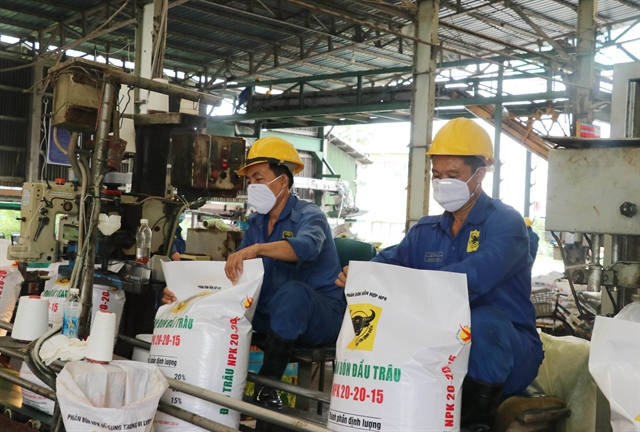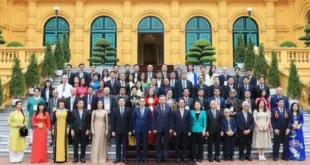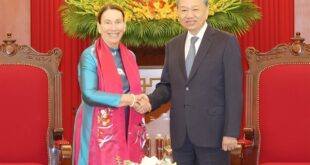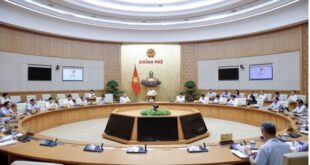
|
| Workers at Bình Điền Fertilizer, one of Việt Nam’s largest fertiliser producers, in southern Long An Province. VNA/VNS Photo |
HÀ NỘI Proposals to amend the Value Added Tax (VAT) Law will be debated during the 28th session of the National Assembly’s Standing Committee with proponents voicing their opinions that there should be a 5 per cent VAT import tax on imported fertilisers and agricultural supplies.
If approved, they believe the taxes will help secure a stable revenue stream for the State’s budget and should be implemented in line with international norms.
Supporters of the proposals said significant imports of fertilisers, which are not subjected to VAT tax, by the Southeast Asian country in recent years have tipped the balance in the market, creating an unfair advantage against domestically produced fertilisers.
Domestic fertiliser producers have voiced concerns over the situation, which has prevented them from declaring and deducting input VAT leading to a 5-8 per cent increase in cost and leaving them vulnerable in competition against imported fertilisers.
They said the country’s current tax regime discourages local companies from making further investments and purchases of new equipment while hindering the production of high-quality products.
In addition, they claimed the absence of VAT on imported fertilisers also adversely affects the State’s revenue and farmers, who must bear the brunt of higher input costs.
Nguyễn Văn Phụng, former head of the Tax Policy Department under the Ministry of Finance said fertilisers account for a large portion of input cost in agricultural activities, along with machinery, and a 5 per cent VAT tax should be reintroduced.
“A 5 per cent VAT tax on fertilisers makes a lot of economic sense and it can help broaden the tax base, which is in line with the country’s Strategy for Reforming the Tax System from 2021 to 2030,” he said.
Phụng added that the current non-tax provision on fertilisers and machinery has caused difficulties for both farmers and manufacturing businesses. He said a unified VAT on imported goods and similar domestically produced goods will help create a more even playing field for all players.
As Việt Nam is making the transition to a market economy, prices should be determined by suppliers and buyers. In the event domestic fertilisers are unable to deduct input VAT, they will have to add it to production costs, which translates to higher prices for farmers. A similar VAT tax should also be applied to machinery used in agricultural activities, he said.
Huỳnh Tấn Đạt, director of the Plant Protection Department under the Ministry of Agriculture and Rural Development said Việt Nam requires around 10 million tonnes of fertilisers per year, with a significant portion of it coming in through imports.
He called for a more balanced approach to the country’s tax regime to ensure an even playing field for both domestic and foreign suppliers of agricultural materials, especially fertilisers and machinery. VNS
- Reduce Hair Loss with PURA D’OR Gold Label Shampoo
- Castor Oil Has Made a “Huge” Difference With Hair and Brow Growth
- Excessive hair loss in men: Signs of illness that cannot be subjective
- Dịch Vụ SEO Website ở Los Angeles, CA: đưa trang web doanh nghiệp bạn lên top Google
- Nails Salon Sierra Madre
 VnExpress News The News Gateway of Vietnam
VnExpress News The News Gateway of Vietnam





